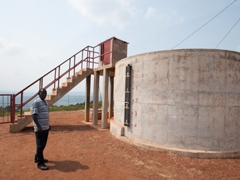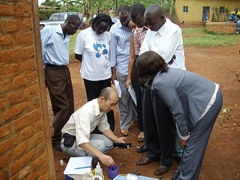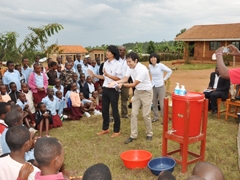- Home
- Countries & Regions
- Africa
- Rwanda
- What Does JICA Do in Rwanda?
- Water and Sanitation
What Does JICA Do in Rwanda?
Water and Sanitation
Overview of the Program for Improvement of Water and Sanitation
Rwandan government aims at increasing safe water access from 74.2% (2010/2011) to 100% by 2017. JICAs' program supports this effort particularly in Eastern province which has the lowest safe water access in the country (66.6%, 2010/2011). The program has three major components: development of water supply infrastructures through Grant Aid projects on one hand, the technical assistance for sustainable operation and maintenance of facilities on the other, and the support to community in water management and hygiene promotion through JICA volunteers.
 Rwakibogo source for MKM [1] scheme (Photo Imamura/JICA)
Rwakibogo source for MKM [1] scheme (Photo Imamura/JICA)
Increasing access to safe drinking water in rural areas (Grant Aid Projects I & II)
From 2007 to 2008, Government of Japan funded the Rural Water Supply Project phase I that constructed and rehabilitated water facilities benefiting to 43,000 populations in Rwamagana, Kayonza and Ngoma districts, consuming a total budget of approx. 6 million USD.
The second phase of the same project started in June 2011 and will supply in water around 55,000 people of Ngoma and Kirehe districts by May 2013, with a total budget of 16 million USD. The Rural Water Supply Master plan for Eastern Province, developed in collaboration with JICA, identified ten priority sites among about 100 projects to be implemented to reach 100% safe water access in the Province. JICA will soon start design study on the priority sites so that it can by supported by expected Project Phase III.
Strengthening operation and maintenance of installed facilities
 Training on water quality analysis
Training on water quality analysis
A technical cooperation "Project for the Improvement of water supply and sanitation in the Western part of the Eastern Province in Rwanda" commonly known as PURA-SANI conducted its activities in four districts Rwamagana, Kayonza, Ngoma and Kirehe between April 2007 and September 2011. It intended to strengthen capacities of local authorities and cooperatives in the management of water facilities. For more than 16,000 people targeted in four pilot sites, the project contributed to better supervision of Water Service Providers by districts, strengthening the capacity of cooperatives and water committees in terms of technical, financial and administrative management of water facilities. The project has worked also on behavior change in terms of hygiene practices in schools and villages in general.
However, crucial problems continue to limit the effectiveness of operation and maintenance of rural water facilities. Recently established EWSA has received the mandate to address rural water management issues but did not yet defined appropriate strategies. Indeed, institutional framework, guidelines and standards, tariffs rates and financial sustainability, private sector involvement and public private partnership approach are among major challenges to deal with. The phase II of technical cooperation in water, "Project for Strengthening operation and maintenance of rural water supply systems in Rwanda" expected to be started early 2013, will support the development of national framework and standards for Operation and maintenance and test them in four districts of the same target zone.

Supporting community management in rural areas by JICA volunteers)
JICA volunteers working in water and sanitation sector contribute also to same objectives of the program. Currently dispatched in different parts of Eastern Province, JICA Water and Sanitation Action Teams (W-SAT) members provide support to local water committees in management, maintenance and operation of hand pumps, and promote good hygiene practices.
They intervene on one hand in maintenance and operation of hand pumps as well as supporting local people to own them by establishing committees for better management. Together with their counterparts, they rehabilitate broken parts and sensitize the users to collect money which can serve them in case the hand pumps are damaged.
On the other hand, they conduct behavior change activities through community and schools so that the community understands the importance of water and hygiene. Considering the demand from Districts, Sectors and Hospitals in Eastern Province, JICA is expecting to increase the number of W-SAT volunteers from 4 (2012, September) to 10 individuals in the year 2013.
Note
- [1] MKM: Mwukire-Kigabiro-Munyaga water piped scheme

- Asia
- Oceania
- Latin America
- Africa
- Angola
- Benin
- Botswana
- Burkina Faso
- Burundi
- Cameroon
- Comoros
- Côte d'Ivoire
- Democratic Republic of the Congo
- Djibouti
- Eritrea
- Ethiopia
- Gabon
- Ghana
- Kenya
- Liberia
- Madagascar
- Malawi
- Mauritius
- Mozambique
- Namibia
- Niger
- Nigeria
- Rwanda
- Senegal
- Seychelles
- Sierra Leone
- Somalia
- South Africa
- South Sudan
- Sudan
- Tanzania
- Uganda
- Zambia
- Zimbabwe
- Middle East
- Europe
- About JICA
- News & Features
- Countries & Regions
- Our Work
- Thematic Issues
- Types of Assistance
- Partnerships with Other Development Partners
- Climate Change / Environmental and Social Considerations
- Evaluations
- Compliance and Anti-corruption
- Science and Technology Cooperation on Global Issues
- Research
- JICA Development Studies Program / JICA Chair
- Support for the Acceptance of Foreign HRs / Multicultural and Inclusive Community
- Publications
- Investor Relations
